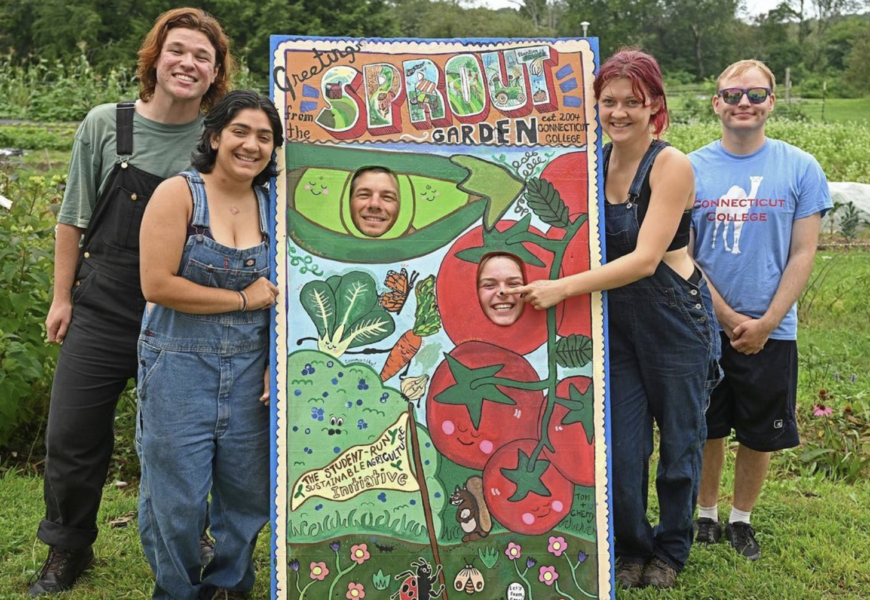Courtesy of Grace Contreni-Flynn
When you think about the careers that young adults today are entering your mind may land on fields such as the economic sector, medicine, or education. However, according to the 2017 US Census of Agriculture, the number of young adults working in agriculture has risen by 2%. While this number may seem small, it is significant considering that the field has been historically dominated by people over 65. The Sprout Garden Summer Internship Program at Connecticut College provides students with an opportunity to engage with agricultural work while continuing their studies.
Sprout Garden is a community produce garden located next to Crozier-Williams Student Center. It began as a student-led project in 2004 and was originally placed next to Earth House, the sustainability-focused student home on campus. The founding community members, Alaya Morning ‘06 and Jim Luce hoped that the garden would provide agricultural education to people on and off campus in the broader New London community. The garden was also designed to provide fresh produce to the dining halls on campus. Both of these goals have been expanded and developed in the almost 20 years since Sprout’s founding.
In 2020, the garden–having moved to its current location–expanded its influence in the Conn College and New London communities. This expansion was, in part, thanks to the recent onboarding of Botany Professor Eric Vukicevich. Vukicevich took the helm at Sprout in 2019, the same year he joined the Botany Department, and quickly got to work establishing connections between the garden and New London food security programs like FRESH New London.
The partnership between Sprout and FRESH has provided 30 New London families in need with fresh produce each summer and fall since 2019. This work is a part of Sprout’s identity as a mission-based CSA. CSAs are community-supported agricultural programs. These programs get community investment by offering a certain number of shares to local families. These shares are typically represented by a pay-what-you-can investment by shareholders at the beginning of the planting season who, in return, receive fresh produce throughout the year. The formal CSA element of Sprout Garden manifests itself in the form of a by-donation table at FRESH every Saturday from 11-1 p.m. in the Summer and Fall. As of writing, this table is hosted at Mercer Garden in New London.
The crop plan at Sprout is adjusted on an annual basis based on New London community surveys offered in English and Spanish. In addition to the work at the by-donation table, Sprout interns donate time to the FRESH youth program during the summer. All Sprout interns are Connecticut College students who choose to live on campus during the summer and dedicate their time to the field and community work needed to run the garden.
Summer 2022 Sprout Intern, David Garcia, found a fulfilling connection with agricultural work and chose to dedicate his time to working at the nearby Stone Acres Farm. When asked why he chose to put classes aside and focus on farming, Garcia responded “It brings a feeling of home for me. I grew up visiting my grandmother’s homestead ranch in Northern Mexico. She has citrus trees, chilies, and chickens she takes care of. I find I’m so much less stressed outside and I guess I just–literally–dig it.” He also remarked that he’s not turning his head on education but rather seeking out a program that provides him with this kind of outdoors and sustainability-focused educational experience. Garcia also finds emotional fulfillment in working at CSAs like Sprout and Stone Acres. Stone Acres has 180 shares and Garcia noted that this is a valuable way for community members to not only get involved in agriculture but to support local farming while getting value back regularly.
On the value that agricultural work brings to individuals, Garcia emphasized that “I feel like, today, many of us are so displaced and disconnected from the natural parts of life. It’s a very humbling experience to plant something and make it grow with lots of trial and error. I feel like it should almost be second nature, in the sense that we know how to read, that we know how to grow our own food.” These salt-of-the-earth experiences are diminishing in the United States with direct-on-farm employment in the United States accounting for only 1.3 percent of the US economy.
2023 Sprout Intern, Caroline Skrebutenas built on Garcia’s sentiment and spoke about her own experience at Sprout, “Eric was like telling us, ‘Okay, go and put your finger in the soil and check the soil. What does the soil need? In farming, there’s such an intuitive aspect. It’s about getting in tune with what the plants are needing.” It’s worth mentioning that Skrebutenas gave her interview while painting one of the many remarkable Sprout Garden signs. These handpainted signs were all made by interns and highlight the history of the Garden as well as its community contributions.
Skrebutenas spoke to the position that Sprout plays in the development of her own education as an Anthropology major, “Food justice is super interesting to me, and I would love to focus on the administrative side of anthropology, to ask how we can make fresh food and involvement in growing food more accessible? So, I’m absolutely going to do more work with FRESH this year and maybe I’ll take up food studies in grad school.” The educational value of gardening and farming cannot be overstated, as expressed by Vukiecevich. The Botany Department currently provides a Sustainable Agriculture Concentration which provides students with the chance to work at Sprout during the school year as a part of their major.
As shown by these Conn community members, Sprout Garden has proven itself to be a cornerstone of environmental and social education on Conn’s campus. If you’d like to learn more about Sprout, you can read the full interview with Vukicevich on the opposite page or below this article online. His expertise in and dedication to agricultural education is appreciable.










